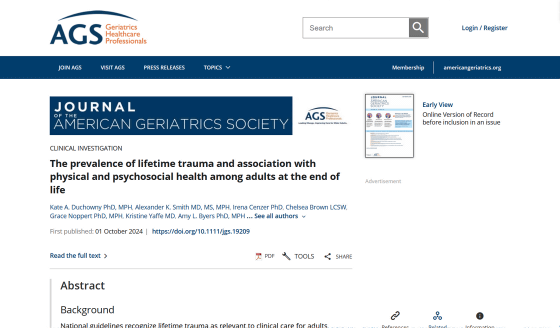Life trauma affects physical pain and loneliness in later life, study finds

The prevalence of lifetime trauma and association with physical and social health among adults at the end of life - Duchowny - Journal of the American Geriatrics Society - Wiley psycho Online Library
https://agsjournals.onlinelibrary.wiley.com/doi/10.1111/jgs.19209

Trauma Takes Its Toll at the End of Life | UC San Francisco
https://www.ucsf.edu/news/2024/10/428576/trauma-takes-its-toll-end-life
Childhood trauma can cause physical pain in late life - Earth.com
https://www.earth.com/news/childhood-trauma-can-cause-physical-pain-in-late-life/
A research team from the University of California, San Francisco and the University of Michigan used data from the Health and Retirement Study (HRS) , which followed approximately 20,000 Americans over the age of 50, to analyze the impact of trauma on the end of life. The study used data from approximately 6,500 people who died during the follow-up period.
During the follow-up period, participants completed an 11-item questionnaire about their experiences with traumatic events and psychosocial health, and were interviewed every two years until their death, at an average age of 78. After their death, family and friends with power of attorney were interviewed to gather information about their health in later life.

The analysis revealed that two in five subjects had experienced childhood trauma, such as trouble with the police or a family member's drug or alcohol abuse, and that the most likely childhood trauma was repeating a grade.
The two most common traumas experienced in adulthood were 'becoming ill with a life-threatening illness' and 'a spouse or child becoming ill with a life-threatening illness.' In comparison, only a minority of participants experienced traumas such as 'the death of a child,' 'a partner becoming addicted to drugs,' 'experiencing a natural disaster,' or 'participating in armed combat.' Overall, more than 80% of participants had experienced at least one trauma in their lifetime, and one in three had experienced three or more traumas.
Among participants who reported no traumatic experience, 46% reported moderate to severe pain and 12% reported feeling lonely at the end of life, whereas among participants who reported five or more traumatic experiences, 60% reported moderate to severe pain and 22% reported feeling lonely at the end of life.
The rate of depression at the end of life was only 24% among participants who had no traumatic experiences, but reached 40% among those who had experienced five or more traumatic experiences. It was also reported that participants who had experienced physical abuse by their parents in childhood were strongly associated with pain, loneliness, and depression at the end of life.

'Our findings suggest that as health care providers, we need to view our patients' needs through the lens of trauma,' said study co-author Ashwin Kotwal of the University of California, San Francisco. 'Near the end of life, people may experience 'total pain' - not just mental and psychological pain, but also pain that has physical causes. Lifetime trauma may shape the overall experience of that pain. Connecting with psychologists, chaplains or social workers may be the most effective way to alleviate that pain.'
Related Posts:
in Science, Posted by log1h_ik







